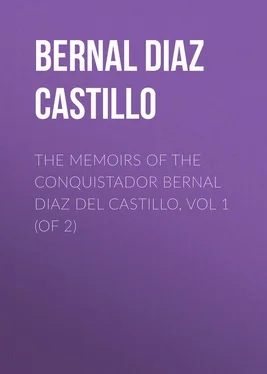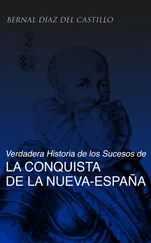Bernal Díaz del Castillo - The Memoirs of the Conquistador Bernal Diaz del Castillo, Vol 1 (of 2)
Здесь есть возможность читать онлайн «Bernal Díaz del Castillo - The Memoirs of the Conquistador Bernal Diaz del Castillo, Vol 1 (of 2)» — ознакомительный отрывок электронной книги совершенно бесплатно, а после прочтения отрывка купить полную версию. В некоторых случаях можно слушать аудио, скачать через торрент в формате fb2 и присутствует краткое содержание. Жанр: foreign_antique, foreign_prose, на английском языке. Описание произведения, (предисловие) а так же отзывы посетителей доступны на портале библиотеки ЛибКат.
- Название:The Memoirs of the Conquistador Bernal Diaz del Castillo, Vol 1 (of 2)
- Автор:
- Жанр:
- Год:неизвестен
- ISBN:нет данных
- Рейтинг книги:3 / 5. Голосов: 1
-
Избранное:Добавить в избранное
- Отзывы:
-
Ваша оценка:
- 60
- 1
- 2
- 3
- 4
- 5
The Memoirs of the Conquistador Bernal Diaz del Castillo, Vol 1 (of 2): краткое содержание, описание и аннотация
Предлагаем к чтению аннотацию, описание, краткое содержание или предисловие (зависит от того, что написал сам автор книги «The Memoirs of the Conquistador Bernal Diaz del Castillo, Vol 1 (of 2)»). Если вы не нашли необходимую информацию о книге — напишите в комментариях, мы постараемся отыскать её.
The Memoirs of the Conquistador Bernal Diaz del Castillo, Vol 1 (of 2) — читать онлайн ознакомительный отрывок
Ниже представлен текст книги, разбитый по страницам. Система сохранения места последней прочитанной страницы, позволяет с удобством читать онлайн бесплатно книгу «The Memoirs of the Conquistador Bernal Diaz del Castillo, Vol 1 (of 2)», без необходимости каждый раз заново искать на чём Вы остановились. Поставьте закладку, и сможете в любой момент перейти на страницу, на которой закончили чтение.
Интервал:
Закладка:
Thus I again took my departure for that country, under the same commanders I subsequently once more visited it. The instructions which our commanders received from Diego Velasquez, were to this effect, that they should barter for as much gold and silver as they could get, and if they deemed it advisable settle colonies, but left this entirely to their own judgment. A person of the name of Penolosa accompanied us in the capacity of comptroller; for priest we had a certain Juan Diaz. We had also the same three pilots who accompanied us on our former voyage; and a fourth, whose name I do not remember. Each had charge of one of the vessels; but the first in command, as chief pilot, was Anton de Alaminos.
But before I proceed with my narrative, I must here remark, that it is not for want of deference on my part, that I barely give the names of the noblemen who were our commanding officers, without adding their titles and describing their several escutcheons, but shall simply call them thus, Pedro de Alvarado, Francisco de Montejo, and Alonso de Avila. I therefore now take this opportunity of saying, that Pedro de Alvarado was a bold cavalier, who, subsequent to the conquest of New Spain, became governor and chief justice of the provinces of Guatimala, Honduras, and Chaopo, and comptoir of Santiago. In like manner Francisco de Montejo, a man of great courage, subsequently was governor and chief justice of Yucatan. I shall merely call them by their proper names, up to that time when his majesty conferred on them honorary titles and sovereign authority.
But to return to my subject, our four vessels lay in the harbour of Matanza on the north coast, not far from the old Havannah, which at that time was not built where it now stands. In this harbour, or at least in its neighbourhood, most of the inhabitants had their stores of cassave bread and pickled meat. Here consequently our vessels were provided with everything they further required. This place moreover had been appointed the rendezvous for all the officers and men.
But, before I continue my narrative, I will explain how this harbour obtained the name of Matanza, 4 4 Puerto de Matanza, the harbour of the massacre. (p. 20 .)
though it may seem rather out of place here; yet, as so many persons have asked me how it originated, there is some excuse.
Some time ago, when Cuba was not quite subdued, it happened that a vessel, bound from the island of St. Domingo to the Luccas, during a heavy storm, was wrecked off the coast. This took place near the river and harbour of Matanza; there were thirty Spaniards and two Spanish ladies on board. In order to convey them across the river, numbers of Indians had collected together from the Havannah and other districts. They appeared most friendly inclined, and offered to carry the shipwrecked across in their canoes and take them to their habitations, where they would give them to eat. The Spaniards accepted this offer; when the Indians, however, had arrived in the midst of the stream, they upset their canoes and drowned them all, save three of the men and one of the females. The men were allotted to the other Indians, but the female, a very beautiful woman, was given to the most powerful of the caziques, the person who had concocted this piece of treachery. From this circumstance it was that the harbour got the name of Matanza.
I was personally acquainted with the female whose misfortune I have just related. After the total conquest of Cuba, she left the cazique in whose power she then was, and married a citizen of Trinidad, by name Pedro Sanchez Farsan.
I was also acquainted with the three Spaniards whose lives had been spared. One was Gonzalo Mexia, an old man, and native of Xeres; the other, Juan de Santiste-ban, from Madrigal; and the third was Cascorro, a sailor and fisherman, of Huelva. The cazique in whose power he was, had given him his daughter in marriage, and bored holes through his ears and nose, after the Indian fashion.
Having thus detained the reader for a while with these old stories, it is time I return to the thread of my narrative.
On the 5th of April, 1518, all of us having met together, the officers and soldiers, the pilots made acquainted with the signals, and the hour of departure fixed, we attended mass with fervent devotion, and weighed anchor. After ten days' sail, we passed the cape of Guaniguanico, called by the sailors San Anton. Eight days after, we came in sight of the island of Cozumel; it happened to be the feast of the Holy Cross. This time our ships were carried further off by the currents than the time before under Cordoba; the consequence was that we now landed on the south coast of the island. We here espied a village, and found a good anchorage near it, perfectly free from all rocks. Our commander-in-chief, therefore, went on shore here with a good body of soldiers. The inhabitants, who had never witnessed such a sight before, immediately took to flight when they saw our vessels approaching, so that not a single one of them had remained in the village. At length we discovered two Indians among the recently cut maise plants, who had not been able to get off quick enough. We brought them into the presence of our captain, who spoke to them with the help of Julianillo and Melchorejo, whom we had captured at the Punta de Cotoche, and who understood their language. The distance between their countries was only four hours' sail, which accounts for the inhabitants of Cozumel speaking the same language. Our commander was very kind to them, gave each some green glass beads, and sent them away to bring the Calachoni of the district, (so the caziques are termed here;) they, however, never returned. While we were still waiting for them, an Indian woman came towards us, comely in appearance, and who spoke the language of Jamaica. She told us that the Indians had fled, out of fear, to the mountains. As I myself and many others among us understood her language, which is the same as that of the island of Cuba, we were quite astonished at the circumstance, and inquired of her how she had got here.
She told us that, two years ago, she had left Jamaica with ten Indians, in a large canoe, in order to go fishing among the islands in this neighbourhood, but had been driven on shore by the currents, when the inhabitants killed her husband with most of her companions, and sacrificed them to their gods.
It struck our commander, as soon as he had learnt this, that the woman might be employed as a negotiator. He therefore desired her to go and fetch the inhabitants and cazique of the district, and gave her two days to return in. We durst not send Melchorejo and Julianillo with her, lest they should run away and return to their own country.
The day following, the Indian woman returned, but informed us that, notwithstanding all her representations, she could neither persuade the Indians nor their wives to accompany her. We called this place Santa Cruz, because we had discovered it four or five days before the feast of the Holy Cross. In this neighbourhood there was plenty of honey, manioc, patates, and large herds of musk swine, which have their navels on their backs. 5 5 The sus tajassu, pecary, or Mexican musk hog; but what our old soldier, with other writers, mistook for a navel, is an open gland on the lower part of the back, which discharges a fetid ichorous liquor. (p. 22 .)
This island contains three poor villages, of which the one I am now speaking of is the largest; the two smaller ones were both situated on a promontory at about six miles distance from each other. Our commander Grijalva, perceiving that it was mere loss of time to make any further stay here, gave orders for re-embarking. The Indian woman of Jamaica went along with us, and we continued our voyage.
CHAPTER IX
How we landed at Champoton.
From this point we sailed in the same direction we had taken under Cordoba, and arrived after eight days' sail off the coast of Champoton, the place where the Indians had so ill used us, as has been related in the proper place. The sea being very shallow in these parts we dropt our anchor at about three miles distance from the shore, and immediately landed in all our boats with half of our men, as near to the village as possible. The inhabitants and other Indians in the neighbourhood gathered themselves together as they had the time before, when they killed fifty-six of our men and wounded all the rest of us. From their bearing and proud demeanour we could easily perceive that they had not forgotten their victory. They were all well armed according to their fashion, with bows, lances, shields, and broadswords, which they wield with both hands. Added to all this they had slings, cotton cuirasses, drums and trumpets, while most of them had their faces painted black and white. They had arranged themselves along the sea shore in order to fall upon us as soon as we landed. But, as our previous loss had taught us prudence, we took with us this time some falconets, and otherwise well armed ourselves with crossbows and matchlocks.
Читать дальшеИнтервал:
Закладка:
Похожие книги на «The Memoirs of the Conquistador Bernal Diaz del Castillo, Vol 1 (of 2)»
Представляем Вашему вниманию похожие книги на «The Memoirs of the Conquistador Bernal Diaz del Castillo, Vol 1 (of 2)» списком для выбора. Мы отобрали схожую по названию и смыслу литературу в надежде предоставить читателям больше вариантов отыскать новые, интересные, ещё непрочитанные произведения.
Обсуждение, отзывы о книге «The Memoirs of the Conquistador Bernal Diaz del Castillo, Vol 1 (of 2)» и просто собственные мнения читателей. Оставьте ваши комментарии, напишите, что Вы думаете о произведении, его смысле или главных героях. Укажите что конкретно понравилось, а что нет, и почему Вы так считаете.












